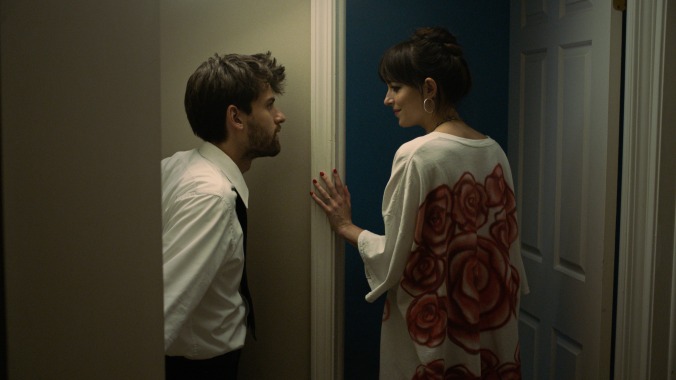In the winning Cha Cha Real Smooth, getting older doesn’t mean you’re growing up
Writer/director Cooper Raiff’s follow-up to the well-received Shithouse is another charming and insightful account of Gen-Z stagnation

In his first two outings as a filmmaker, Cooper Raiff has focused on college and post-collegiate characters who don’t know where they’re headed in life, even if Raiff’s career is clearly headed in the right direction. His 2020 debut feature, Shithouse, was a real surprise: a disarming, puppy dog story of a lonely college freshman trying to find his place amongst his peers and with the opposite sex. Andrew, the main character in Raiff’s sophomore effort, Cha Cha Real Smooth, is a notch up in age yet he’s also stuttering and stumbling in the endearing way we’ve come to expect from a character conceived and played by the 24-year-old Dallas native. Sure, if you removed all of Andrew’s nervous hesitation and shy fumfering, Cha Cha Real Smooth would be about 10 minutes shorter. But then you’d lose the painfully identifiable, “there but for the grace of God go I” moments that make Raiff such an appealing chronicler of youthful drift.
Raiff has managed to carve out a refreshing niche for himself by avoiding both the no-budget navel-gazing of the mumblecore movement and the bro posturing of the man-child comedy. What’s left feels carefully crafted, yet loose and natural, a testament to his ability to channel his generation’s restlessness in a way that’s less of a pity party and more recognizably searching and ultimately hopeful. Cha Cha Real Smooth may strike some as twee and eager to be loved, and Raiff sometimes comes perilously close to overplaying the aw-shucks card. However, the film shines as a funny and heaven-sent confirmation that post-millennial masculinity doesn’t have to turn toxic.
Indeed, Raiff’s brand of virility finds ample room for empathy, and as much as Andrew is defined by his gawky earnestness, he’s also defined by how he treats the women in his life, especially those in need of his emotional ministrations. These attitudes can be traced back to the film’s “past is prologue” opening, when a pre-teen Andrew (Javien Mercado) declares that he’s fallen in love with the woman he briefly saw crying in a stairwell at a bar-mitzvah. She tenderly shoots him down, but what he learns about himself comes into play 10 years later after Andrew graduates Tulane and moves back in with his mother (Leslie Mann) and stepfather (Brad Garrett).
Wasting time working at a mall food court, Andrew is firmly stuck in post-collegiate limbo when his little brother, David (Evan Assante), asks that he accompany him to a bar-mitzvah. The shindig is a dud until Andrew works the room and gets everyone on the dance floor. Soon, all of the local New Jersey moms start hiring Andrew to pump some life into their kids’ bar-mitzvahs.
Raiff makes a clever choice by using bar and bat-mitzvahs as the springboard for Andrew’s journey to maturity. These religious rites of passage (and embarrassment-filled dance parties) mark a Jewish child’s transition to adulthood. Andrew’s innate decency masks the fact that he’s an adult in age only and has yet to experience his own emotional rite of passage. That begins to change when the beautiful Domino (Dakota Johnson) walks into a bar-mitzvah with her autistic daughter, Lola (Vanessa Burghardt). They’re immediately on the receiving end of cruel gossip, which is catnip to someone like Andrew and his seemingly bottomless well of compassion. When he coaxes the hesitant Lola onto the dance floor, Domino is so impressed that she asks Andrew to be Lola’s babysitter.
Raiff excels at creating characters adrift on a cloud of uncertainty and then lighting the fuse that propels them into the next phase of their lives. Andrew’s issues are easier to diagnose and will be solved in a beautiful moment when Domino’s tough-looking fiancé (Raúl Castillo) delivers a line that almost singlehandedly shocks Andrew into full emotional awareness. Domino is a tougher nut to crack. She’s the product of becoming a mother at a very young age and Johnson brings an air of mystery and open-hearted vulnerability to a character whose wisdom was gained the hard way. Her late-night discussions with Andrew in the quiet intimacy of her home are dances of conflicting motivations, and the film generates a sublime sense of romantic tension during these encounters.
Cha Cha Real Smooth has an unforced charm and lack of guile that’s refreshing and stops just short of being precious and ingratiating. Word of warning, though: If Raiff maintains his current course, his next film could tip over into solipsism. He still seems to mistakenly believe that the more characters say, the more attached we become to them. “I feel there are things that you just, like, don’t say to me and I can’t tell whether you’re, like, holding back a desire to be close, or a desire to be distant” is the kind of unwieldy dialogue that isn’t natural so much as it’s excruciatingly self-conscious.
Otherwise, Raiff writes as if he’s invested in all his characters, and he provides them opportunities to state their case as individuals. Lola could have embodied the worst kind of representational box-checking. Credit to the wonderful Burghardt for making her a smart young woman who knows what she wants. Even the underwritten role of Andrew’s mother scores thanks to Mann’s apple-cheeked positivity despite the character’s bi-polar disorder that Raiff hints at, then never explores.
If nothing else, Cha Cha Real Smooth looks better in your streaming queue than Shithouse, a “Dude, I can’t believe they let me call my movie ‘Shithouse’” title that (rightfully or not) turned off certain audiences. Cha Cha Real Smooth refers to DJ Casper’s dance hit, Cha Cha Slide, a bar-mitzvah staple released in 2000. So it looks like Raiff’s off-kilter, forehead-slapping titles are here to stay. If his warm and loose-limbed insights into the current generation are here to stay, too, he can name his movies whatever he wants.